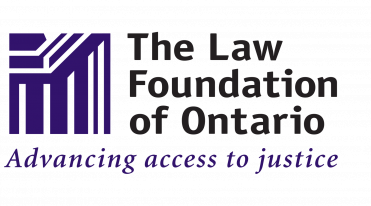The Law Foundation of Ontario recently granted close to $680K for nine projects that aim to improve the ways that frontline community workers or “trusted intermediaries” help their clients who have legal problems.
The Trusted Help grants were made through the Foundation’s Strategic granting program and are a direct result of research the Foundation commissioned in this area. The 2018 report, Trusted Help: The role of community workers as trusted intermediaries who help people with legal problems, describes the many ways that frontline community workers are providing support. Some of these include identifying possible legal issues, providing legal information, making referrals to legal professionals, helping clients to complete legal forms, and accompanying clients to meetings or hearings.
The Trusted Help grants build on the research findings and further support the pivotal work of community workers. The funded projects include:
- A partnership between Community Legal Education Ontario (CLEO) and the Association of Community Legal Clinics (ACLCO), which has the potential to have a system-wide impact by strengthening the engagement and capacity of community legal clinics across the province to train and support trusted intermediaries in their communities.
- Innovative training of health service providers that recognizes that people’s health can be affected by legal issues they are experiencing. This training will promote justice and health partnerships that address legal issues that are connected to the social determinants of health (such as housing and employment) and give health service providers tools to identify legal issues and make appropriate referrals to their legal partners.
- Trainings of frontline workers who work with: people with housing issues; Francophone women who have experienced violence; women in Northwestern Ontario who have experienced violence; persons with low literacy; the elderly; and Indigenous people who are engaged with the criminal justice system and would benefit from stronger community justice programs.
Trusted Help grants
ACORN Canada
Catalyzing access to justice during short interactions with low-income tenants
$28,033
ACORN will undertake a two-step research initiative – an environmental scan and two focus groups – to identify legal issues experienced by low-income tenants in Ontario. It will then develop a portable and user-friendly tool and train its staff and volunteers to use the tool to identify legal problems and to direct community members to sources of legal information and advice largely in the areas of housing and consumer rights. The new portable tool, whose primary purpose is to assist community members to address legal issues before they escalate, will be piloted in Toronto, Hamilton, and Ottawa.
Action ontarienne contre la violence faite aux femmes (AOcVF)
Portail juridique pour les intermédiaires de confiance
$85,000
AOcVF will develop an online French-language resource that highlights questions in various fields of law that are mostly commonly asked by women who have been impacted by violence. The portal will explain the legal rule or procedures to keep in mind as well as links to additional resources. It will include a section to help trusted intermediaries identify legal questions in client stories and a section that highlights the difference between providing legal advice and information. This resource will help trusted intermediaries to find relevant legal information and better support their clients.
Centre for Equality Rights in Accommodation (CERA)
Bridging the Gap Together – Enhancing LTB Legal Competency
$98,776
CERA will study existing service gaps at the Landlord and Tenant Board (LTB) to identify strategic responses available to frontline workers. It will work with a committee of community partners from across the GTA, including Dixon Hall Neighbourhood Services, East York East Toronto Family Resources, and LAMP Community Health Centre, to develop and deliver tools and training for frontline workers to build legal competency of community workers on LTB matters. A province-wide training webinar will also be developed and CERA will provide phone support to assist frontline workers with individual client case management. This initiative will work to prevent evictions and homelessness among vulnerable renters facing hearings at the LTB.
Community Advocacy & Legal Centre (CALC)
Justice & Health Partnerships: Virtual Training Workshops & Community Forums for Healthcare Professionals
$100,000
CALC will create a series of virtual workshops using an action research methodology that healthcare professionals can access on-demand and provide justice & health forums for interested communities across Ontario. Workshops will build healthcare professionals’ capacity to identity, refer, and address legal issues. Forums will introduce this new vision for access to justice and collaborations with trusted intermediaries that will better reach vulnerable and low-income populations and, in particular, rural communities.
Community Legal Education Ontario (CLEO)
Building Community Legal Clinic Capacity to Train Community Workers
$95,000
CLEO and the Association of Community Legal Clinics of Ontario (ACLCO) propose to work together to build engagement and capacity in community legal clinics across the province to train and support trusted intermediaries in their communities.
Community Legal Education Ontario (CLEO)
Community Legal Education for Literacy and Basic Skills Learners
$46,260
CLEO and Community Law School (Sarnia-Lambton) Inc. (CLSSL) propose to: develop learning activities that will be piloted by CLSSL through at least one local literacy organization that trains and tutors adult learners; adapt the learning activities for province-wide distribution to the literacy sector; and conduct outreach and roll-out the learning activities to literacy organizations across the province.
Northwestern Ontario Women’s Centre
High Risk Navigation Network and Protocol
$91,728
The Northwestern Ontario Women’s Centre, in partnership with the Thunder Bay and District Coordinating Committee to End Woman Abuse, will develop and pilot a high-risk navigation model/response system protocol in Thunder Bay for women and children facing violence. The partnership will also develop and deliver expert training for trusted intermediaries in gender-based violence theory and practice, and in turn, they will provide training for legal system actors. The project will increase collaboration between community-based advocates and the justice system to intervene in incidents with the most severe potential consequences.
Ontario Federation of Indigenous Friendship Centres (OFIFC)
Trusted Intermediary Education Project
$100,000
The Trusted Intermediary Education Project is a professional development training for the OFIFC’s Community Justice Program (CJP) Coordinators who facilitate culture-based diversions for urban Indigenous communities. The proposed project will provide CJP Coordinators with curriculum to train volunteers to support with the diversions process, best practices for program outreach, and training on developing effective memoranda of understanding.
Schlegel-University of Waterloo Research Institute for Aging
Trusted Help – Facilitating Access to Justice in Care Campuses across Ontario
$34,762
The Schlegel-University of Waterloo Research Institute for Aging will conduct a needs assessment at one of the 19 Schlegel Villages in Ontario (long term care and retirement homes) to determine the legal needs of its residents, and ways to best address the needs. The goal of the initiative is to facilitate access to justice for the older adults that live in its residences via trained frontline workers who may identify legal issues, provide legal information, and assist in navigating the legal system.


